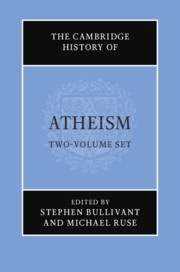Book contents
- The Cambridge History of Atheism
- The Cambridge History of Atheism
- Copyright page
- Dedication
- Contents
- Acknowledgments
- Contributors
- Introduction
- Part I Preliminaries
- Part II Atheisms in History
- Part III Reformation, Renaissance, Enlightenment
- Part IV Classical Modernity: Philosophical and Scientific Currents
- Part V Classical Modernity: Social and Political Currents
- Part VI Twentieth and Twenty-First Centuries: Intellectual and Artistic Currents
- Part VII Lived Atheism in the Twentieth- and Twenty-First Centuries: Case-Studies
- 42 Latin America
- 43 The Road to Modern China
- 44 Contemporary China
- 45 Atheism in India: Twentieth Century and Beyond
- 46 The Soviet Union
- 47 Modern Germany
- 48 The Nordic and Baltic Countries
- 49 United States
- 50 The Pacific Northwest
- 51 Tunisia
- 52 Southern Africa
- 53 Traditional Societies
- Part VIII Emerging Atheisms in the Twenty-First Century
- Part IX Conclusion
- Index
- References
50 - The Pacific Northwest
from Part VII - Lived Atheism in the Twentieth- and Twenty-First Centuries: Case-Studies
Published online by Cambridge University Press: 25 September 2021
- The Cambridge History of Atheism
- The Cambridge History of Atheism
- Copyright page
- Dedication
- Contents
- Acknowledgments
- Contributors
- Introduction
- Part I Preliminaries
- Part II Atheisms in History
- Part III Reformation, Renaissance, Enlightenment
- Part IV Classical Modernity: Philosophical and Scientific Currents
- Part V Classical Modernity: Social and Political Currents
- Part VI Twentieth and Twenty-First Centuries: Intellectual and Artistic Currents
- Part VII Lived Atheism in the Twentieth- and Twenty-First Centuries: Case-Studies
- 42 Latin America
- 43 The Road to Modern China
- 44 Contemporary China
- 45 Atheism in India: Twentieth Century and Beyond
- 46 The Soviet Union
- 47 Modern Germany
- 48 The Nordic and Baltic Countries
- 49 United States
- 50 The Pacific Northwest
- 51 Tunisia
- 52 Southern Africa
- 53 Traditional Societies
- Part VIII Emerging Atheisms in the Twenty-First Century
- Part IX Conclusion
- Index
- References
Summary
When I first started thinking about atheism in Tunisia, I carried with me the certainty that atheism does not exist as a possibility in Tunisian society. With the passing years, the term Mulhid (atheist) has become common not merely in intellectual circles, but in rap songs, social media, and even classrooms. However, the existence of atheism as a possibility does not necessarily entail its acceptance. In fact, the identity of the Tunisian citizen, of the one who truly belongs to the nation, rests on a discursive process in which non-Muslims are defined as ‘foreigners’, ‘alienated’, and others. In this national imaginary of belonging, the non-Muslim Tunisian occupies a position that is thought to be improper and dangerous, even a threat to the sense of identity and the social order of the Tunisian nation. This form of abjection is one in which the non-Muslim existence is cast as the antithesis of the Arab-Muslim identity of a Tunisian and its core values.
- Type
- Chapter
- Information
- The Cambridge History of Atheism , pp. 932 - 951Publisher: Cambridge University PressPrint publication year: 2021



